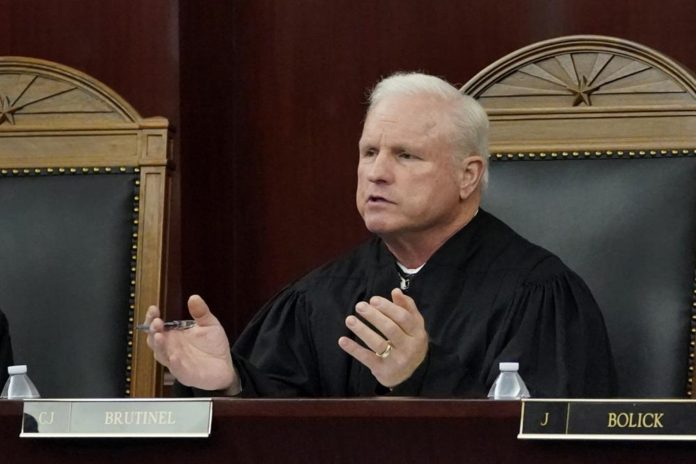
A voter initiative rolling back Republican-backed election law changes and expanding voting access will not appear on the November ballot, the Arizona Supreme Court ruled Friday, issuing a final death knell after an on-again-off-again series of court rulings.
The high court decision upholds a lower court ruling issued hours earlier, in which Maricopa County Superior Court Judge Joseph Mikitish rejected thousands of signatures and said the initiative fell 1,458 signatures short of the 238,000 required to qualify for the ballot. The judge’s Friday ruling reversed his own decision from a day earlier after the Supreme Court asked him to explain how he concluded that the initiative had enough valid signatures to qualify.
The Supreme Court’s ruling is the last word in a weeks-long battle between initiative backers and opponents. Critics, led by the Arizona Free Enterprise Club, succeeded in knocking off enough qualifying signatures for the measure to barely fail.
Lawyers supporting the initiative had urged the Supreme Court to allow the measure to reach voters, saying Mikitish violated the law by letting challengers throw out more signatures than allowed.
“In reversing itself today, the trial court has done something never done before in Arizona initiative practice and which is not authorized by statute,” they wrote. “It has allowed initiative challengers to strike individual signatures under (the law), for any reason, AND allowed them to benefit from the invalidity rate calculated by the County Recorders’ random sample that the challengers DID NOT include in this lawsuit.”
But Chief Justice Robert Brutinel, in a brief order, simply upheld the revised ruling and kept the initiative off the ballot. When the judge upheld the measure the day before, Brutinel had refused to accept it, saying the court was unable to determine exactly how Mikitish came to his determination that backers had collected enough valid signatures for the measure to appear on November’s ballot.
The Arizona Free Enterprise Club said in a statement that the high court ruling “vindicates what we knew all along: the radical Free and Fair election initiative lacked enough lawful signatures to qualify for the ballot.
“The other side knew it too, and that is why their lawyers tried to get the court to adopt a rigged methodology to calculate the final number of valid signatures that would sneak their disqualified measure onto the ballot.”
The initiative backers called the legal challenge a continuation of Republican-led efforts to gut Arizona’s initiative process. The state constitution says the people have the right to craft their own laws, but the Legislature and business groups have pushed for changes that make it easier to kick initiatives off the ballot.
Voters will see GOP efforts along those lines in November. Several laws making it harder for initiatives to pass or be changed were referred to the ballot for voters to weigh.
“Certain politicians have been intentionally trying to attack the ballot measure process for over a decade to prevent voters from being able to make decisions about Arizona’s future at the ballot box,” the initiative committee said in a statement. “Today’s decision is a continuation of these attacks and reflects an increasingly extreme MAGA agenda.”
The high court had already ruled in challenges to two other initiatives, keeping them on the November ballot. The justices said Wednesday that business groups that challenged a proposal requiring greater transparency for political spending and boosting the amount of assets shielded from creditors failed to knock off enough signatures.
Republican Gov. Doug Ducey and the GOP leaders of the House and Senate had urged the high court to reject all three measures. Ducey has appointed five of the seven justices.
Mikitish has presided over three weeks of hearings in a case filed by a pro-business group that challenged many of the nearly 400,000 signatures the initiative backers filed. After lawyers for the Arizona Free Enterprise Club succeeded in knocking off nearly 96,000 signatures, and a county review to determine if the signatures were valid kicked off nearly 64,000 more, it was left with just 2,281 more than the required 237,645 signatures needed to make the ballot.
On Friday, Mikitish flipped those numbers.
The Free and Fair Elections measure sought to change a slew of election laws. It would have specifically blocked the Legislature from overturning the results of presidential elections, an avenue some Republicans explored after former President Donald Trump’s loss in the state in 2020.
It also would have guaranteed ballot privacy and bars handing election materials or ballots over to outside groups like the state Senate did after 2020, expanded voting access, mandated that all voters can go to any polling site, extended early voting, and limited lobbyists’ ability to wine and dine lawmakers.
The measure also would eliminate the “strict compliance” legal standard that led Mikitish to disqualify many of the petition sheets. The GOP-controlled Legislature required that standard for initiatives in 2017, making it easier to throw them out for relatively minor paperwork errors.
The Free Enterprise Club challenged tens of thousands of signatures, many for exceptionally minor issues.
For instance, 7,000 signatures were challenged because a volunteer petition circulator mistakenly checked a box that indicated they were paid circulators.
Republished with the permission of The Associated Press.













